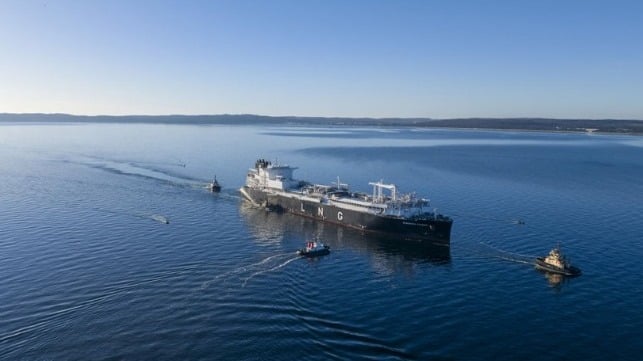LNG Tanker Briefly Grounds Sparking New Criticism of Germany’s LNG Imports

A Norwegian LNG tanker, Iberica Knutsen, briefly grounded on Thursday morning May 22, outside the German port of Murkan, but while the vessel quickly recovered environmentalists and other activists have locked on to the event to criticize Germany’s LNG import terminals. Germany moved quickly after Russia attacked Ukraine to establish FSRU terminals so that it could begin gas imports from the United States and elsewhere.
The vessel which was built in 2006 and operated by Knutsen Group was inbound from the U.S.’s Sabine Pass loaded with natural gas. It has a capacity of 138,000 cubic meters and is a standard-size vessel at 909 feet (277 meters) and an operating draft of 37 feet (11.4 meters).
A local resident told a German reporter he was making his morning coffee shortly after 6:00 am on Thursday and looking out the window he noticed “that the tanker was in a place where it shouldn’t be and that it was moving strangely,” reports Berliner Zeitung. “I immediately suspected it was stuck.”
The resident said he watched over the next hour as three tugs worked to free the LNG tanker. The German water police (Wasserschutzpolizei) were also on the scene. After about an hour, the tugs escorted the vessel into the nearby anchorage. The water police report the vessel has been ordered to remain there while they investigate. It cannot move until a survey is completed of the hull.
While, overall, it was a minor incident it sparked new calls for Germany to end its imports of LNG. Critics argue the terminals were rushed in response to the efforts to stop Russian imports. In the case of the terminal at Murkan, it is near the popular German resort area of Rügen Island. It was the only privately developed terminal set up by Deutsche ReGas.
“Today's incident demonstrates that there is an urgent need to catch up on Rügen. We have long been pointing out the safety risks associated with LNG delivery and the operation of the terminal,” said Sascha Müller-Kraenner, Federal Managing Director of DUH (German Environmental Aid). “We demand an immediate halt to further deliveries and an independent review of the safety concepts at this site."
Critics argue the terminal is underutilized and not necessary, especially because of its location. They point to data that said it was operating at just five percent of capacity. Deutsche ReGas has said part of the problem was unfair competition from the state-sponsored terminals. The company cut back on the operations ending the charter of an FSRU terminal.
Germany however needs the import capabilities to replace gas imports from Russia, which previously came in via pipelines. The country was able to stockpile gas, especially imported from the U.S. to meet its strong demands during the winter heating season. It has promised to end Russian imports but that makes the FSRU terminals an even more important part of the energy supply.
